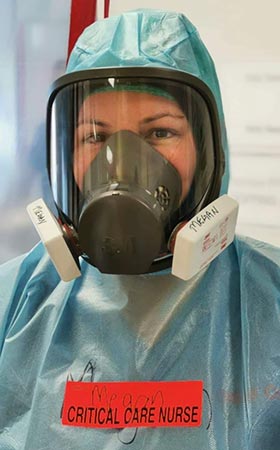
Megan Stowers (Ngāpuhi) had been providing cultural support to Māori patients informally in her various roles at Waikato District Health Board (DHB) for years. After a conversation with critical care nurse educator Sarah Rogers last year, as COVID-19 emerged, they agreed to formalise her role as a Māori resource nurse.
While there was no salary attached and it was alongside her critical care nursing role, Stowers agreed to it, although it “feels very alone at times” she told Kai Tiaki Nursing New Zealand. “I just can’t not do anything about this. It’s heavy and I am burning out as a mum and a nurse, but I can’t let our people come through our unit and not be there for them.”
Stowers told the NZNO College of Critical Care Nurses in March that nursing Māori with COVID-19 had been “delicate, complex but honourable.
“The hard thing for Māori was [missing] the kanohi ke ti kanohi – face to face, rongo – the feel, smell and how you perceive a person, and tūhono – the bonding connection you create, which are really important parts of the delivery of care.”
Doing this in full protective gear was “nearly impossible”, she said. Nurses struggled to provide the holistic, spiritual care expected by whānau Māori when a patient was dying. The emotional burden felt “heavy”, Stowers said. “At times we felt really helpless, as we knew there was a crucial part of he korowai oranga – the cloak of wellness – we were unable to provide.”
“I looked him in the eye and introduced myself in te reo Māori to establish that connection with him, through whakawhanaungatanga.”
Caring for one Māori patient in isolation, however, had shown the importance of her role. “I shook his hand through two layers of gloves. I looked him in the eye and introduced myself in te reo Māori to establish that connection with him, through whakawhanaungatanga [connecting]. Looking beyond my glasses and my respirator mask, I offered strength and comfort and warmth, hoping he could see the smile in my eyes. Most importantly of all, I got to ask him who he was – ko wai koe mātua? I needed to know who this gentleman was.”
Taking the time to do this, she said “set the foundation of care for the rest of this man’s journey.
“Hours after this conversation, I held his hand while we called his daughter to say her papa was deteriorating and we would need to intubate quite quickly.” She became the link with his whānau, who was unable to visit him, keeping them in touch by phone.
This experience was both “special, delicate and scary” for her. After the man died, several of the critical care staff were invited to his tangi – a huge sign of respect, Stowers said.
In her role generally, Stowers identifies Māori patients and introduces herself to them and their whānau – then introduces the whānau to the other nurses. She makes sure the patient has been referred to the hospital’s kaitiaki – Māori cultural support worker – and supports colleagues with whakawhanaungatanga protocols, te reo Māori and pronunciation – particularly of names. “That’s what I would want to hear when I wake up – my name said properly.”
Some colleagues view her mahi as “special treatment,” which could be hard. “I make time to make a kaumātua a cup of tea. I will go and collect a family member from the waiting room and walk them in,” she said. “Some colleagues are absolutely fine with me doing this, some are used to me doing this and some think otherwise.
“I just want to remind us that in te ao Māori this is normal, this is respectful, and this is the level of care that is expected.”
Rogers said the effect of Stowers’ work was clear, with happier and calmer whānau in the unit. “They understand what’s going on and have a greater level of trust, because they are connected with and trust Megan.” She acknowledged the role could be a lonely one and said she and the DHB cultural support office tried to support Stowers.
There had been lots of interest in the initiative from other departments, and she was putting together a role description, hoping it could eventually be resourced and extended to other parts of the hospital, region and country.
NZNO professional nursing adviser Angela Clark said the initiative could be a “trail-blazer” for critical care and/or intensive care units nationwide. “The current health system is not fit for all and we must address disparities and prioritise Māori health experiences and te ao Māori.”




